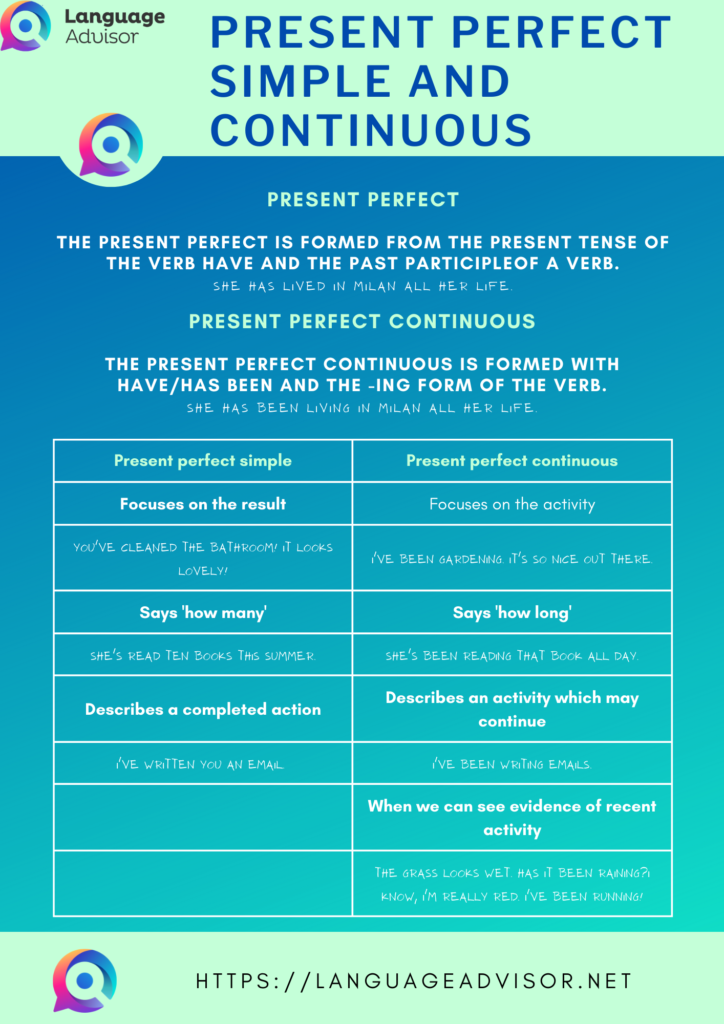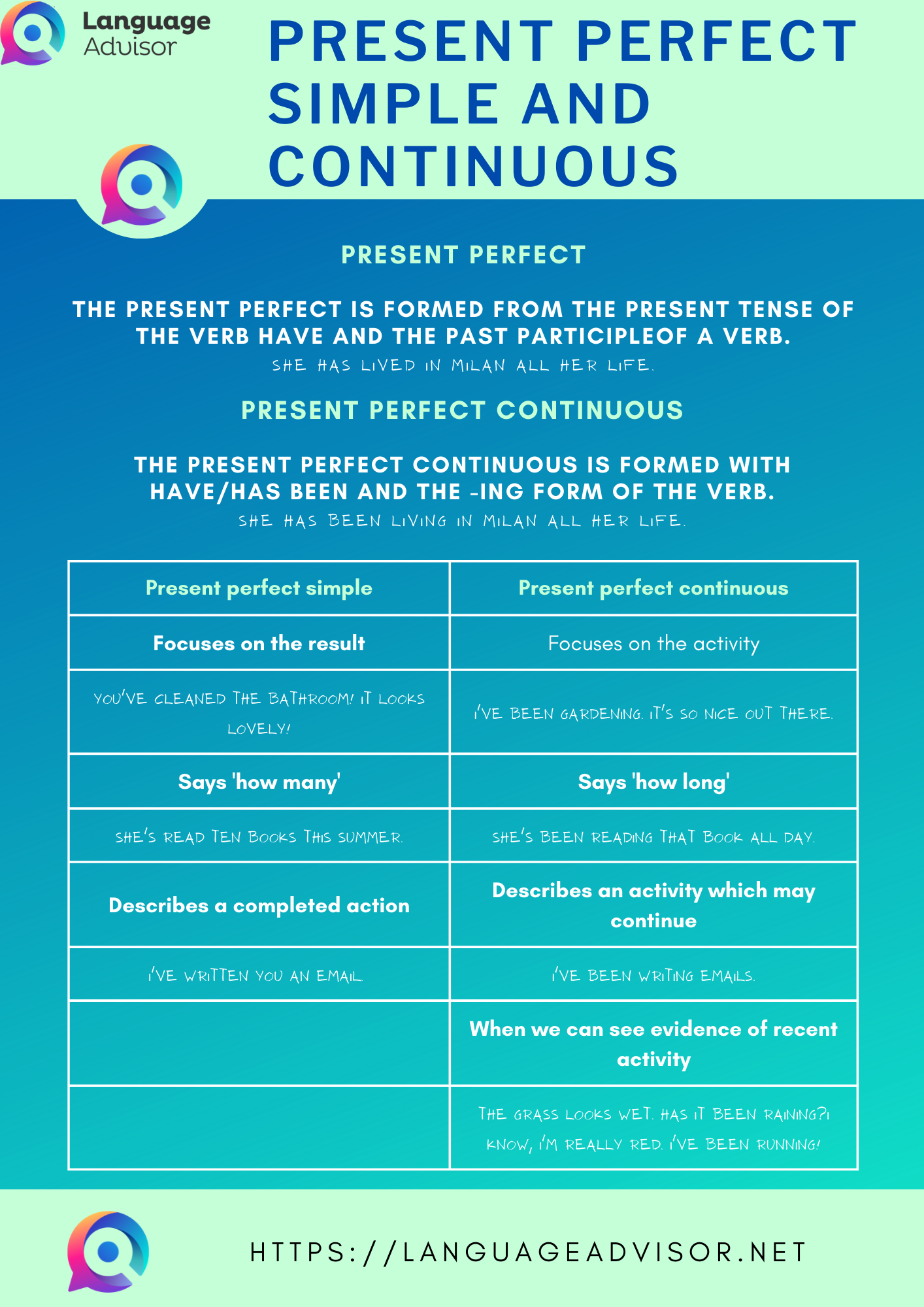Present Perfect Simple and Continuous. English grammar with exercises. English ESL Worksheets. Free eBook and Free printable PDF
Present Perfect Simple and Continuous
Present Perfect Simple and Continuous


Present perfect
The present perfect is formed from the present tense of the verb have and the past participleof a verb.
We use the present perfect:
– for something that started in the past and continues in the present:
They‘ve been marriedfor nearly twenty years.
She has lived in Milan all her life.– when we are talking about our experience up to the present:
I‘ve seen that film before.
I‘ve played the guitar ever since I was a teenager.We often use the adverb ever to talk about experience up to the present:
My last birthday was the worst day I have ever had.
and we use never for the negative form:
Have you ever met George?
Yes, but I‘ve never met his wife.– for something that happened in the past but is important in the present:
I can’t get in the house. I‘ve lost my keys.
Teresa isn’t at home. I think she has gone shopping.
Have been and have gone
We use have/has been when someone has gone to a place and returned:
A: Where have you been?
B: I‘ve just been out to the supermarket.A: Have you ever been to San Francisco?
B: No, but I‘ve been to Los Angeles.But when someone has not returned, we use have/has gone:
A: Where’s Maria? I haven’t seen her for weeks.
B: She‘s gone to Paris for a week. She’ll be back tomorrow.
Present perfect with time adverbials
We often use the present perfect with adverbials which refer to the recent past:
| recently | just | only just |
Scientists have recently discovered a new breed of monkey.
We have just got back from our holidays.
or adverbials which include the present:
| so far until now up to now ever (in questions) yet (in questions and negatives) |
Have you ever seen a ghost?
Where have you been up to now?
A: Have you finished your homework yet?
B: No, so far I‘ve only done my history.
After a clause with the present perfect we often use a clause with since to show when something started in the past:
I‘ve worked here since I left school.
I‘ve been watching that programme every week since it started.
We do not use the present perfect with adverbials which refer to a finished past time:
I have seen that film
yesterday.
We have just bought a new carlast week.When we were childrenwe have been to California.
but we can use the present perfect with adverbials which refer to a time which is not yet finished:
Have you seen Helen today?
We have bought a new car this week.
Present perfect continuous
The present perfect continuous is formed with have/has been and the -ing form of the verb.
We normally use the present perfect continuous to emphasise that something is still continuing in the present:
She has been living in Milan all her life.
It‘s been raining for hours.We do not normally use the present perfect continuous with stative verbs. We use the present perfect simple instead:
I‘ve always
been likingliked Richard.
Present perfect for future
We normally use the present simple to talk about the future in clauses with before, after, until, etc.:
I’ll keep looking until I find my book.
We’ll begin when everyone arrives.but we can also use the present perfect:
I’ll keep looking until I have found my book.
We’ll begin when everyone has arrived.





Present Perfect Simple and Continuous
We use both the present perfect simple (have or has + past participle) and the present perfect continuous (have or has + been + -ing form) to talk about past actions or states which are still connected to the present.
I’ve had three coffees already today!
They’ve been waiting for hours.
The present perfect simple usually focuses on the result of the activity in some way, and the present perfect continuous usually focuses on the activity itself in some way.
| Present perfect simple | Present perfect continuous |
| Focuses on the result | Focuses on the activity |
| You’ve cleaned the bathroom! It looks lovely! | I’ve been gardening. It’s so nice out there. |
| Says ‘how many’ | Says ‘how long’ |
| She’s read ten books this summer. | She’s been reading that book all day. |
| Describes a completed action | Describes an activity which may continue |
| I’ve written you an email. | I’ve been writing emails. |
| When we can see evidence of recent activity | |
| The grass looks wet. Has it been raining? I know, I’m really red. I’ve been running! |
Ongoing states and actions
We often use for, since and how long with the present perfect simple to talk about ongoing states.
How long have you known each other?
We’ve known each other since we were at school.We often use for, since and how long with the present perfect continuous to talk about ongoing single or repeated actions.
How long have they been playing tennis?
They’ve been playing tennis for an hour.
They’ve been playing tennis every Sunday for years.Sometimes the present perfect continuous can emphasise that a situation is temporary.
I usually go to the gym on the High Street, but it’s closed for repairs at the moment so I’ve been going to the one in the shopping centre.





Present Perfect Simple and Continuous: exercises
THE PRESENT PERFECT SIMPLE
EXERCISE 1.
Choose a verb from the box below and put it in the present perfect form
| Study cook play visit work eat wait pass sing jump welcome wash |
e.g. They have studied medicine at the University
Paul________ spaghetti for dinner.
George and his friends ___________ water polo once.
Sheila_________ her little cousins this week.
My mother and father _____ always a lot in their life.
Lucy _________ all the lemon ice-cream which was in the fridge.
Mark ________ his coach for two hours but it yet.
David, Peter and John _________ in a church choir up to now.
Michael _________ his French and English friends.
They __________ the dishes.
EXERCISE 2.
Add a sentence. Use the present perfect.
e.g. There are no biscuits left. (We/eat/all)
We have eaten them all.
1. Sarah and Bill have a big new flat in the city centre. (They/recently/buy)
She is happy now. (She/find/new job)
I can speak five languages. (I/live/in different continents)
It is really cold today. (It/rain/a lot)
Stephen has a bad headache. (He/drink/too much)
PRESENT PERFECT WITH FOR AND SINCE
EXPLANATION
We use for when we are interested in the duration of the action
e.g. I have lived in New York for three years.
We use since when we are interested in the exact moment in which the action started
e.g. I haven’t seen Bob since Christmas
EXERCISE 1
Complete the sentences below by using for or since.
e.g. They have been painting that wall for three hours.
I have worked here ____________last July.
They have lived in Madrid _____________two months.
Jim has waited for Eva ________________ten minutes.
I haven’t talked to Laurie _____________last Monday.
Nick and John have attended school together ______________ten years.
I haven’t seen Thomas _____________ages!
I have spoken to Katie______________ one hour.
I lived in Milan _______________ six years.
My mother has been shopping ____________ 9 o’clock this morning.
Terry waited for the bus _______________ an hour.
Lisa was Matthew’s girlfriend ___________ 5 years.
Sharon has studied Italian _______________ she was 12 years old.
Joanna has been dancing ____________ 2 hours.
Linda has been drinking ________________ midnight.
Andy has had his car _______________1992.
EXERCISE 2
When do we use for? When do we use since?
e.g. for 30 minutes
since 1999
_______________________ your birthday
_______________________ last month
_______________________ three months
_______________________ 1997
_______________________ a decade
_______________________ two centuries
_______________________ three weeks
_______________________ last Monday
_______________________ Christmas
_______________________ 10 minutes
_______________________ July, 3rd 2000
_______________________ 10 days
_______________________ 15 years
_______________________ last weekend
HOW LONG…?
EXPLANATION
When we use how long…? We are interested in the duration of a certain action.
e.g. How long have you studied French?
This means that I want to know for how many months, years, hours etc. this person has studied French.
In the answer you can use either for or since.
EXERCISE 1
Complete the exercise by answering the following questions and using either for or since.
e.g. How long have you lived in New York?
I have lived in New York for two years.
1. How long have you studied English?
2. How long have you lived in your town?
3. How long have you worked in your field?
4. How long have you practised your favourite sport?
5. How long have you studied at university?
6. How long have you worked with your favourite colleague?
7. How long have you been married/engaged?
THE PRESENT PERFECT WITH “JUST”
EXERCISE 1
Complete the following sentences by using the verbs given. Use the Present Perfect tense + just.
| drink / marry / arrive / wake up / buy / phone / eat / leave / correct / watch |
e.g. Where are Jane and Marty? They are missing! We can’t start without them!
Look! They have just disappeared!
1. I wonder if our tests went well.
Look! The teacher _____________________________
2. Last night my mother baked a delicious cake.
Look! My brother______________________________
3. It’s 8.00 a.m. Is Jake at work?
No! He______________________________________
4. What time is the Linda’s train arriving?
Look! It______________________________________________
5. When is Jonathan leaving for France?
Look! He ____________________________________
6. My neighbours need a new car.
Look! They ___________________________________
7. Are David and Michelle still engaged?
No! They ____________________________________
8. Don’t forget to call Andrew. It’s important!
Don’t worry! I _________________________________
Would you like to see this film?
No thanks, we _________________________________
Does your mum want a cup of coffee?
No thanks, she ________________________________
EXERCISE 2
Answer the questions with the words given
e.g. Would you like a slice of chocolate cake?
(no/thanks/just/have/slice/vanilla cake)
No, thanks. I have just had a slice of vanilla cake.
1) Have you written to your friend David?
(Yes/just/finish/writing)
2) Why don’t we go to the hairdresser’s?
(No/just/wash/hair)
3) Let’s go to a Chinese restaurant for lunch!
(No/just/cook/spaghetti)
4) Would you like a cigarette?
(No/thanks/just/put/one/out)
5) Has Sheila met her boyfriend?
(Yes/just/meet/him/at/supermarket)
6) Could you phone Henry to check if he has already arrived home?
(No/he/just/phone/to say/he/arrive/home)
7) Would you like to read my new autobiography?
(No/thanks/just/read/it)
EVER/NEVER
EXERCISE 1
Make questions and invent answers
e.g. You/ever/go/to Australia
Have you ever been to Australia?
No, I have never been to Australia
1) She/ever/eat/frogs
2) He/ever/drink/Chinese beer
3) They/ever/be/in love
4) You/ever/spend/a holiday in the mountains
5) We/ever/meet/a famous person
6) She/ever/be/in prison
7) What is the most beautiful art exhibition/you/ever/visit
THE PRESENT PERFECT CONTINUOUS
EXERCISE 1
Put in the verbs. Use the present perfect continuous.
E.g. My head hurts. I have been studying English all morning!!
1) I am very tired. I (work/hard) for two days.
2) Michael and Sandra feel bored. They _______________ (watch/TV) all day.
3) Oh dear! We cannot go for a picnic this afternoon, it is all wet! It____________ (rain) all morning!
4) Mark is hot and feels really tired. He_______________ (walk) for three hours.
5) Fiona is really angry. She______________(wait) a long time for her husband.
6) The two girls have made friends. They _______________ (talk) for hours.
7) John and Sara are exhausted. They_____________(jog) in the park for one hour.
EXERCISE 2
Present perfect simple or present perfect continuous?
Circle the right one
1) I am really satisfied. I (have found/have been finding) a very interesting job.
2) Susan has come back from France. She (has been touring/has toured) the country for one month.
3) Where are all my biscuits?! (Have you been eating/have you eaten) them all?
4) Maggie (has known/has been knowing) Paulette for a long period.
5) How many pages of that book (have you read/have you been reading)?
6) Michael (has had/has been having) flu these days but he (has not stayed/has not been staying) away from work.
7) Andy and Susan (have been looking/have looked) for a flat since they got married.





All downloads are in PDF format
Present Perfect Simple and Continuous exercises: eBook and PDF
BROWSE THE EBOOK ONLINE OR DOWNLOAD THE PDF FOR FREE





DOWNLOAD THE PDF FOR FREE










